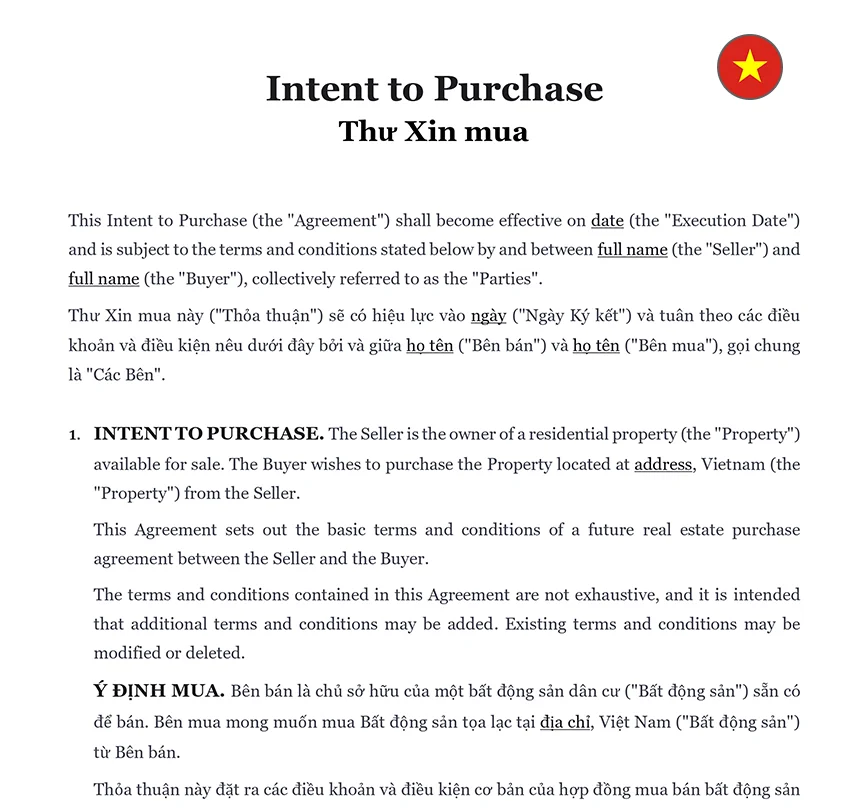Ready to use legal template
Drafted by experienced lawyers
Vietnamese-English translation
Ready to use legal template
Drafted by lawyers
Vietnamese-English translation
Home › Buy a property › Intent to purchase letter
Learn more about Intent to Purchase Letter in Vietnam
An Intent to Purchase Letter for real estate is a formal document that expresses a buyer’s serious interest in purchasing a property. It outlines the basic terms and conditions of the proposed transaction, such as the property details, proposed purchase price, deposit amount, and timeline. While it is typically non-binding, it serves as a crucial first step in real estate negotiations, showing the buyer’s commitment and helping both parties align expectations. In Vietnam, this document is often used before drafting a formal Sale and Purchase Agreement and is especially useful for building trust between parties. Download our Intent to Purchase letter template available in an easy to edit Word format and drafted by expert in English and Vietnamese.
Table of contents
What is an Intent to Purchase letter?
What is included in an Intent to Purchase Letter?
Why is an Intent to Purchase Letter important in Vietnam?
Can I use an Intent to Purchase Letter for any type of purchase?
How do I send an Intent to Purchase Letter in Vietnam?
What are the next steps after sending an Intent to Purchase Letter
Can I cancel an Intent to Purchase Letter once it's been sent?
Do I need to notarize an Intent to Purchase Letter in Vietnam?
What happens if the seller rejects my Intent to Purchase Letter?
What is an Intent to Purchase Letter?
An Intent to Purchase Letter, often referred to as a Letter of Intent (LOI), is a preliminary document used in commercial transactions to outline the fundamental terms and conditions of a proposed purchase. It serves as a formal declaration of one party’s intention to enter into a business deal with another party.
An Intent to Purchase Letter includes details such as the names of the parties involved, a description of the goods, services, or property to be purchased, the purchase price, payment terms, proposed timeline for the transaction, and any other important terms or conditions.
While an Intent to Purchase Letter is not a legally binding contract in itself, it is considered a formal indication of the parties’ commitment to negotiate in good faith and to proceed with the transaction, subject to the terms outlined in the letter. It is often used in complex transactions to establish a framework for negotiations and to ensure that both parties are in agreement on the basic terms before moving forward with a formal contract.
What is included in an Intent to Purchase Letter?
An Intent to Purchase Letter is typically non-binding, meaning that either party can walk away from the transaction without legal consequences. However, it serves as a formal expression of intent and can be used as a basis for negotiating a formal purchase agreement. It usually includes the following key elements:
1. Parties Involved
The full names and contact information of both the buyer and the seller.
2. Description of Transaction
A clear and concise description of what is being purchased, whether it’s goods, services, or real estate.
3. Purchase Price
The agreed-upon price for the purchase, including any deposits or down payments.
4. Payment Terms
Details regarding how and when the payment will be made, including any installment plans or financing arrangements.
5. Timeline
The expected timeline for the transaction, including important dates such as the closing date or delivery date.
6. Conditions
Any conditions that must be met before the transaction can be completed, such as obtaining financing or conducting due diligence.
7. Confidentiality
A clause stating that the terms of the letter are confidential and may not be disclosed to third parties.
Why is an Intent to Purchase Letter important in Vietnam?
An Intent to Purchase Letter is an important document in Vietnam as it helps to facilitate the buying process, clarify expectations, and protect the interests of both parties involved in the transaction. This letter serves several important purposes in commercial transactions:
| ➤ Clarity and Understanding: It helps to ensure that both parties have a clear understanding of the key terms of the proposed transaction. This can help prevent misunderstandings and disputes later on. |
| ➤ Negotiation Framework: It provides a framework for negotiating the final terms of the purchase agreement. By outlining the basic terms in the LOI, the parties can focus their negotiations on more specific details. |
| ➤ Commitment: While an LOI is typically non-binding, it demonstrates a commitment from both parties to proceed with the transaction. This can give confidence to both parties that the deal will move forward. |
| ➤ Due Diligence: It allows the buyer to conduct further due diligence on the purchase before committing to a binding agreement. This can include inspections, financial analysis, and other investigations to ensure the purchase is sound. |
| ➤ Legal Protection: While not usually legally binding, an LOI can provide some legal protection by establishing a framework for the transaction. It can also help to establish the intent of the parties in case of a dispute. |




